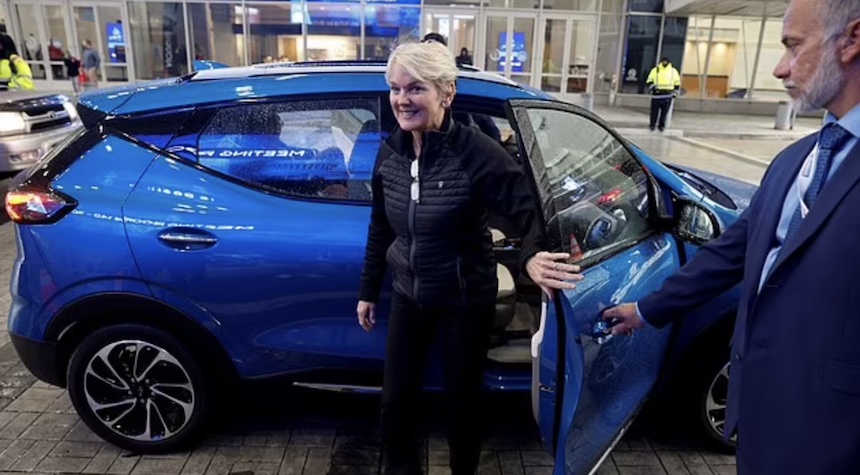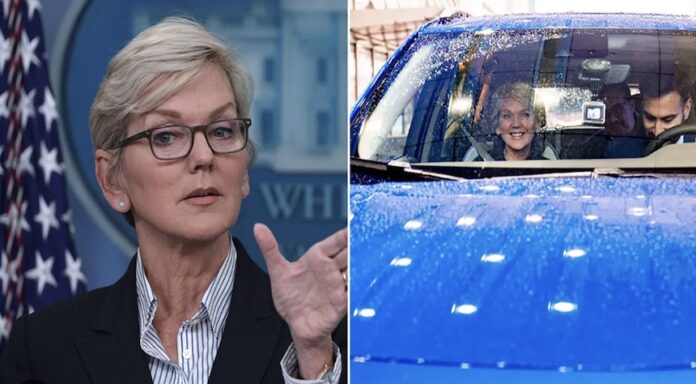The recent electric vehicle stunt by Energy Secretary Jennifer Granholm could cause the Biden administration even more headaches. House Republicans have launched an investigation into Granholm’s ill-fated journey, which led to the police being called when her vehicle blocked a charge spot.
The purpose of the road trip was to promote electric vehicles and highlight the investments made by the White House under President Joe Biden in green energy. Now, Republicans want answers.
Republicans on the House Oversight and Accountability Committee have been investigating Energy Secretary Jennifer Granholm about her recent electric car (EV) road trip where she and her team were stopped by police.
In a letter sent to Granholm on Tuesday, Oversight Chair James Comer, R. Kentucky, and Oversight Subcommittee Chairman Pat Fallon, R. Texas, said they were looking into the road trip in June, which was intended to “boost a charade about the effectiveness of green power.”

Comer and Fallon sent a letter to Granholm stating that “this taxpayer-funded publicity stunt shows yet again how out-of-touch the Biden Administration with the consequences of the policies it has unleashed upon everyday Americans.”
They continued, “Committee Republicans are committed to preserving consumer freedoms, such as vehicle choice, in the face of an unproven and costly Biden Administration push that forces all Americans to purchase EVs.” We request documents and details to better understand the costs and outcomes of your summer EV road trip in 2023.
The four-day trip from North Carolina to Tennessee was designed to show the potential of electric cars and to make a case for clean energy. It only highlighted the limitations and challenges of the electric vehicle infrastructure within the United States. We previously reported that:
The trip showed that the system was not yet ready to handle the current number of vehicles, let alone the total switchover they were looking for.
Granholm and her entourage had to deal with limitations at times between stops. Granholm’s caravan of EVs, including a luxury Cadillac Lyriq and a Ford F-150, was planning to charge in Grovetown, a suburb of Augusta, Georgia.

Her team of advanced workers realized that there wouldn’t be enough chargers for everyone. One of the four chargers at the station was broken and others were already occupied. A staffer at the Energy Department parked a non-electric vehicle near one of the chargers that were working to save space for the secretary of energy.
It was not well received: the gas-powered vehicle blocked the only spot available for a charger.
A family who was boxed in — on a hot day with a baby inside — was so angry that they called the police.
Granholm acknowledged that the experiment had failed and blamed the failure on “poor judgment on the part of the team”. The investigation seeks to scrutinize further the decision-making processes surrounding the road trip.
House Republicans referred to this road trip correctly as a stunt. It makes you wonder what an investigation like this would reveal. It could reveal how taxpayer money was used to promote clean energy during the UAW strike. A probe is unlikely to yield any results other than to give the Biden administration another stick to beat them with.

It could, however, raise questions about the role of government in promoting electric vehicles and clean energy. Several Democrats have expressed support for using government power to force Americans to switch to electric cars. Although clean energy is a desirable result, it would be foolish to suggest the state forcefully impose this. Persuasion is more likely to be effective in getting Americans to switch to electric cars than forcing them to do so. It may be more effective to build the infrastructure needed to support this paradigm shift rather than forcing it on us.
This article highlights the challenges electric vehicles face in terms of public acceptance and infrastructure. This story serves as a warning that introducing these vehicles to the public before the infrastructure is ready is a bad idea. The government should not interfere in the industry. Instead, it would be better to let the market pioneer the use of clean energy for transportation.


